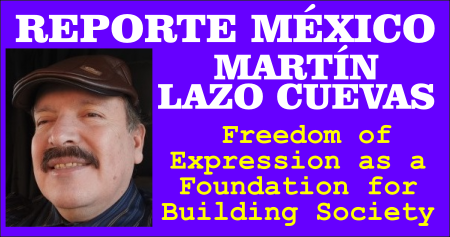MARTÍN LAZO CUEVAS:Freedom of Expression as a Foundation for Building Society

By Martín Lazo Cuevas
Freedom of expression is one of the most fundamental human rights and,
at the same time, one of the most demanding in its exercise. Protected
by legal instruments such as the Universal Declaration of Human Rights (Article
19) and national constitutions like Mexico’s (Article 6), this freedom
enables individuals to express thoughts, ideas, and opinions without
fear of censorship or reprisals, while respecting the rights of others
and public order.
However, the true value of freedom of expression lies not only in its
formal existence but in its conscious and constructive exercise by all
social actors.
The citizen exercises their right by participating in public life: by
expressing opinions, proposing ideas, denouncing injustices, and
engaging in debate. Their voice forms the foundation of a dynamic,
pluralistic, and ever-evolving society. Every citizen who expresses
themselves responsibly helps build a stronger social fabric, where
differences enrich rather than divide.
The government representative, when exercising freedom of expression,
carries an amplified responsibility: their words are not just personal
opinions but acts of institutional communication. They must speak with
truth, clarity, and respect, avoiding the use of discourse as a tool of
manipulation or exclusion. Their expression should strengthen citizens'
trust in institutions.
The social, political, or religious leader finds in freedom of
expression a power to summon and transform. Their words can mobilize
great collective efforts or trigger painful divisions. Therefore, their
speech must be imbued with strong ethical principles, a vision of the
common good, and an awareness of their influence over those who listen.
The journalist and the writer are natural guardians of freedom of
expression. From rigorous investigation to the narrative construction of
our realities, their work is essential to ensure society has access to
truthful information and spaces for reflection. They do not merely
inform: they help educate citizens in the critical exercise of their own
freedom.
In conclusion, exercising freedom of expression is an act of permanent
social construction. It is not merely about speaking: it is about
speaking to build, to dialogue, to correct, to inspire. It is about
ensuring that every spoken or written word carries the seed of better
understanding, a stronger democracy, and a more dignified coexistence.
Defending freedom of expression means not only ensuring that everyone
can speak but also cultivating the responsibility to speak with social
awareness, ethics, and hope. Only then, word by word, will we build the
free, just, and united society we all long for.












